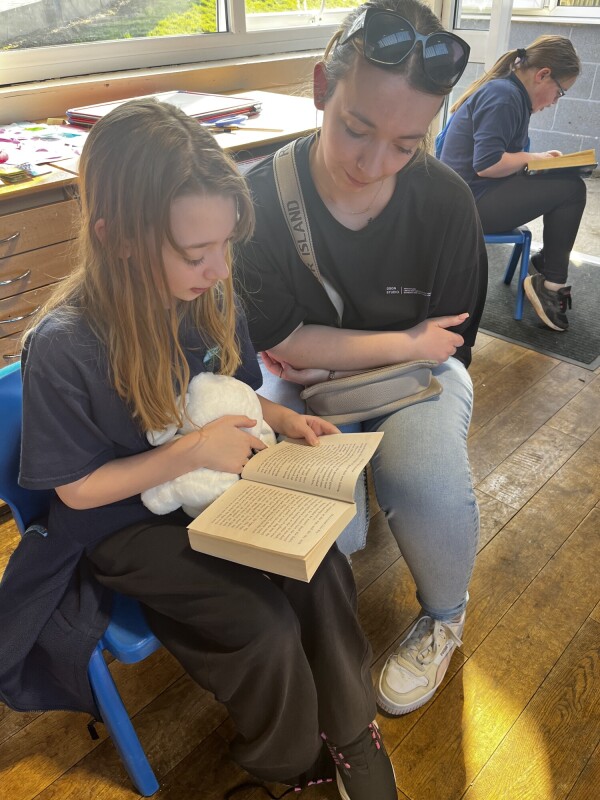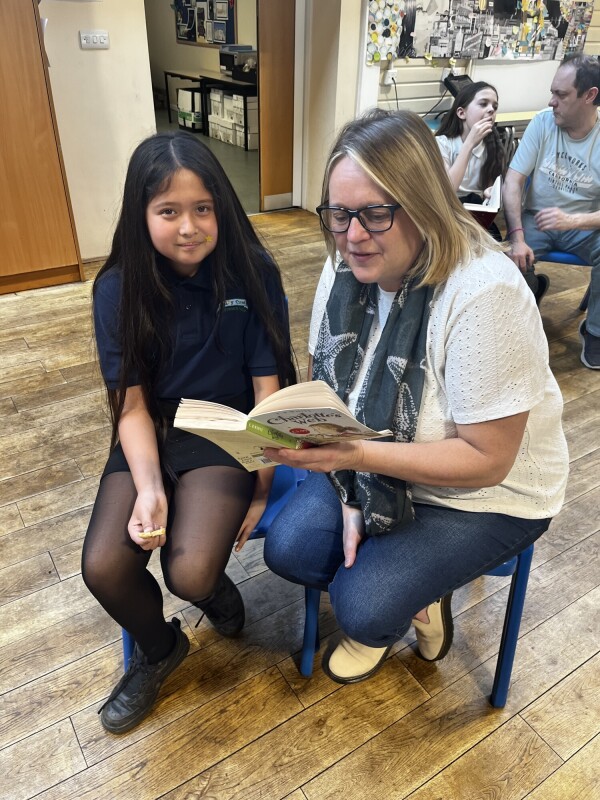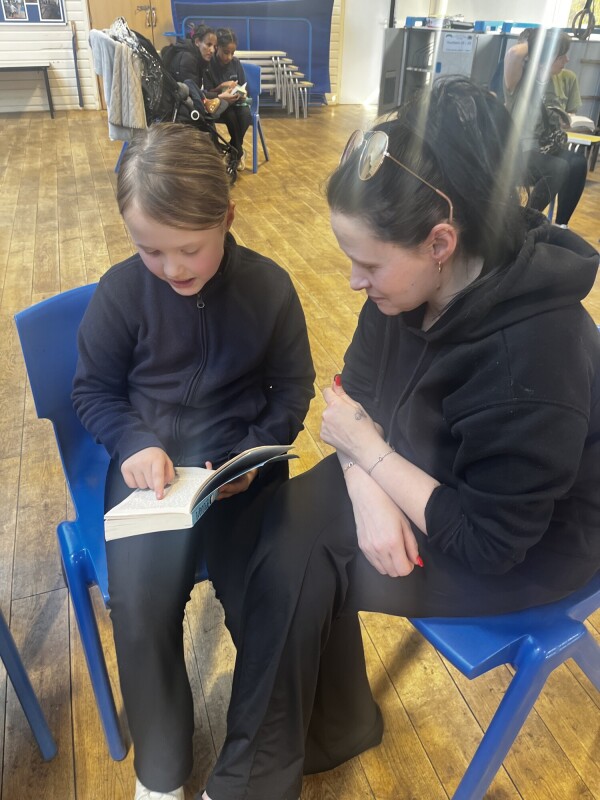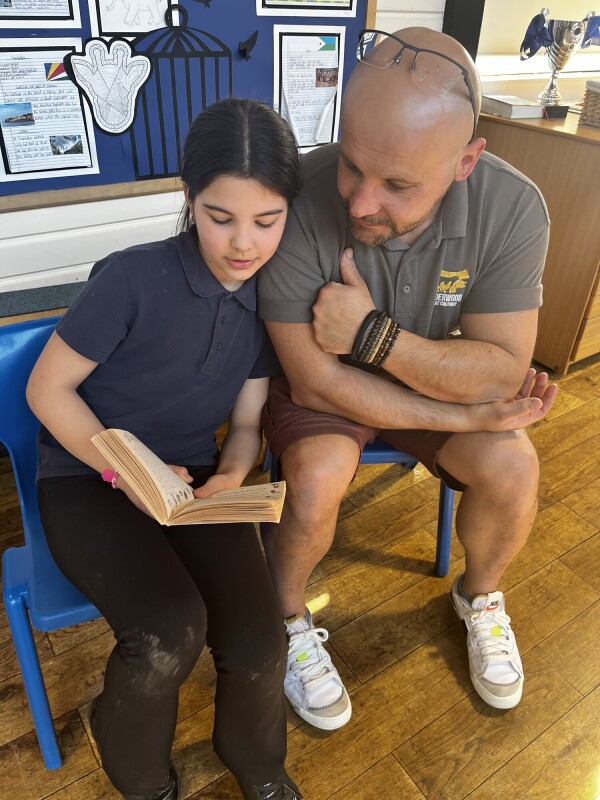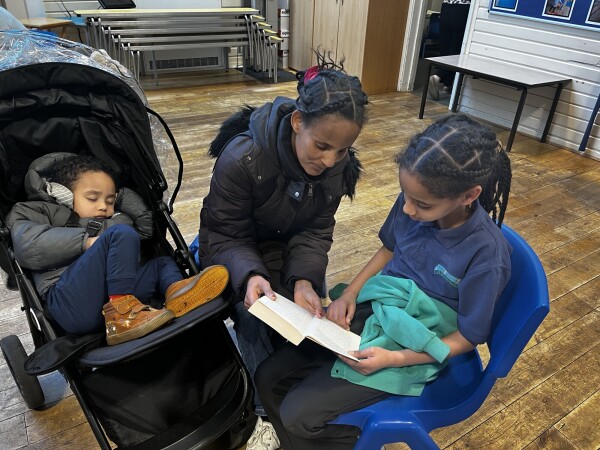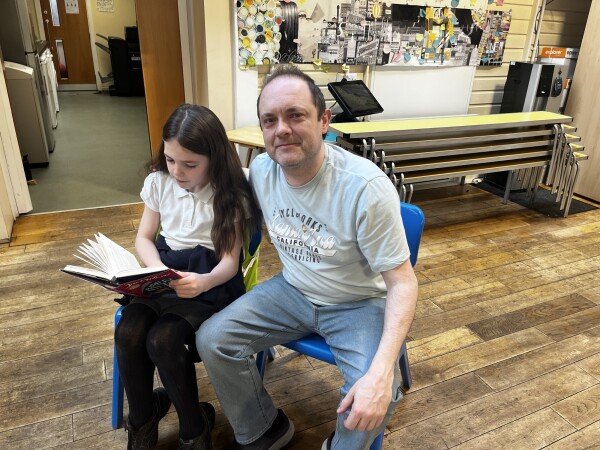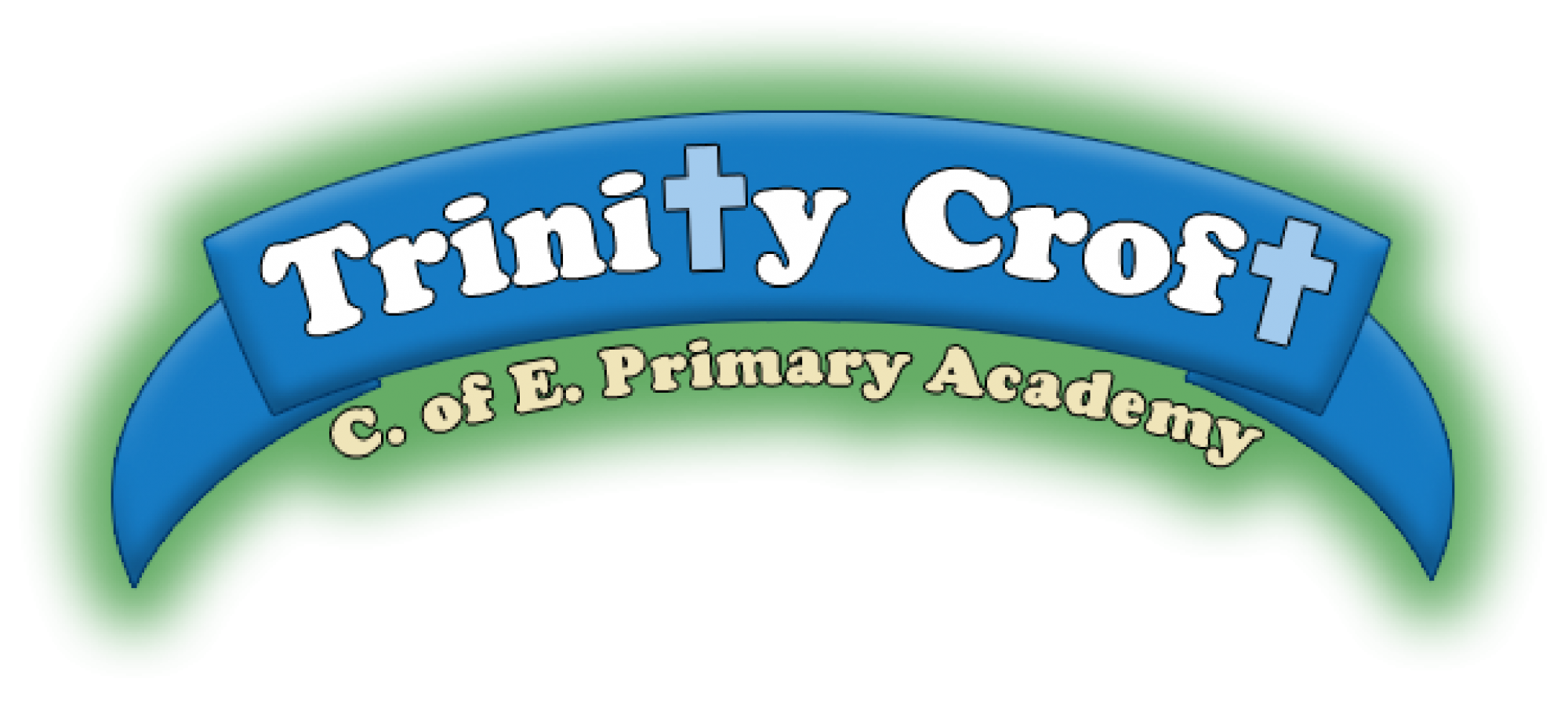Reading and Phonics Curriculum
Our Reading Intent
The aim at Trinity Croft is to provide opportunities for children to develop as independent, confident, resilient and successful, life-long learners.
Through the implementation of a broad and balanced curriculum, we aim for our children to have high aspirations and to make an active and positive contribution to their school, their community and the wider society; now and in the future.
Our reading curriculum is intended to broaden vocabulary and to expand knowledge, reading underpins children’s chances of success across the primary curriculum and we strongly believe in equipping children with the skills needed to read for purpose and for pleasure. With this in mind our mission is to guide and support children’s reading so that every child is reading at their age related level and gains pleasure from reading.
At Trinity Croft we will offer children an opportunity to grow through inspired learning “We understand Jesus to be the Word of God, the self-expression and self-giving of God, who relates to the whole of creation (John 1:1-5;Colossians 1:15-20; Ephesians 1:8-10).
English Leaders:
Early Reading and Phonics Lead– Mrs. J Towers
English Lead- Mrs. R. Cooper
At Trinity Croft C of E Primary School, we are passionate about reading and we feel that reading is at the centre of our curriculum. We believe in the importance of developing children’s phonics skills as early readers, moving onto comprehension skills when children are ready. We understand the importance to develop children’s love of books and reading.
Our School Leadership Prioritises Reading
Along with the English subject leader and the early reading leader, the school leadership prioritises reading. Regular meetings are held with the early reading lead to discuss priorities in training, analyse data and look for ways forward. Visits to phonics lessons occur regularly ensuring consistency across the school. There are opportunities for coaching from the Early reading leader who is in turn supported in their own professional development by development days and termly meetings with a RWI national trainer.
Love of Reading is Promoted
The love of reading is promoted widely across school. Staff are passionate about reading, which inspires children. Core texts are read daily to children by the teacher. This gives the teacher chance to emphasise their story voice and illustrate their excitement at new stories. The teacher chooses their books using CLPE for guidance- Centre for Literacy in Primary Education- to ensure that the texts are of high quality and age appropriate. Reading corners have been developed to promote a love of reading. Each year have a set list of texts that they want children to read by the end of the year. This encourages children to take the books home, therefore improving their vocabulary, fluency and excitement around reading. In addition to this, teachers display recommended books in their book area, to encourage children to want to read them. At Trinity Croft, we have a reading rocket display, which encourages children to read more at home. Certificates are awarded when children have read 50, 100, 150, 200 and 250+ times at home. In our bespoke reading diaries, parents are given ideas on how to support children at home with reading. This includes the phonics sounds and comprehension questions.
Phonics and Early Reading
Content and Sequence Supports Progress
At Trinity Croft, all staff are highly trained in delivering the Read, Write, Inc Phonic programme.
- Information for parents, relating to the programme, can be found by accessing the following link: http://www.ruthmiskin.com/en/parents/
The programme has a strong focus on teaching children to know and remember more. Children are taught daily, in small groups, from Reception upwards. The small groups children are in ensure that all children are taught at their appropriate level, which results in good progress being made. The RWI programme supports the teach simply model:
Review/ Revisit- Previously taught sounds and words are continuously reviewed and revisited at the beginning of every RWI Phonics lesson.
Teach Simply – Children are taught a new sound following the same sequence daily.
Practice Thoroughly- Children have the opportunity to practise reading the sound in words, including multi-syllabic words.
Apply- Children apply reading their new sounds in alien words and in closely matched, phonically decodable books.
Assess- Children are regularly assessed by the Phonics Leader. Teachers assess throughout the lesson to check that children understand. ‘Spotlight children’ (children who are not making as much progress as the rest) are sat in the focus of the teacher, to ensure they don’t get left behind.
Although our intention is for children to ‘keep up’, not ‘catch up’, if the Early Reading Leader identifies that any children are falling behind, plans are immediately put in place to support catch up. If needed, children are also assessed in KS2. Children in Foundation Stage- to Y4 have RWI Phonics lessons, if needed, and Y5 and Y6 who are working below age related expectations are using Fresh Start- a reading intervention.
Pupils Falling Behind Catch Up Quickly
The Reading Leader quickly identifies children who are falling behind and discusses them with the class teacher. Children are assessed every half term, but they can be assessed sooner than this, if the Early Reading Leader and English Lead thinks this is necessary. The English Lead puts together a support plan for these children and shares these with the teachers and teaching assistants. These support plans include five layers of provision to be put in place for children.
- The daily phonics lesson is taught robustly.
- The child has 1:1 daily phonics tutoring every afternoon. This is delivered by a trained phonics tutor.
- Virtual classroom links (extra phonics lessons) are sent home to parents for extra practice.
- Children are given extra time on an iPad to watch the virtual links in school.
- Teachers have an extra 5-minute phonics lesson in an afternoon.
Phonics from the Beginning of Reception
Phonics is taught from the very beginning of Foundation Stage 2. If children are ready, some of the sounds are taught from the Summer term of Foundation Stage 1. We believe that a strong start in Reception has a big impact on children’s progress and confidence in reading. By the end of the Foundation Stage, we want children to be able to read all of the Set 1 and Set 2 sounds in words. Children are identified from the beginning if they are falling behind.
Phonically Decodable Books
From Foundation Stage 1, library books are sent home with children. Their focus is language acquisition and listening to stories being read to them. As children begin Read, Write, Inc, children are sent home with sound cards to practise their sounds. When they are secure with their understanding of sounds, children will be given virtual links for games to practise their oral blending. Following this, children will be sent home with sound blending books. When children move into the Ditty group, they will take a perfectly matched phonically decodable book home with them. This continues, until children have moved securely off the programme. As well as a phonically, decodable book, children will take a library book home with them. This is to encourage parents to read to their children and develop their vocabulary. Books are changed weekly, so children have time to practise their phonics sounds, as well as building their fluency. If children struggle with their fluency, there are extra fluency links that can be sent home to support children, as well as classroom interventions.
Early Reading Experts
All staff at Trinity, from nursery to KS2, have been trained in RWI phonics. The Early Reading Leader and English Lead attends half termly training sessions to ensure that she is aware of any updates. This is then relayed back to staff in school. All staff have access to the virtual classroom, where they have a large range of training videos for each aspect of phonics. The Early Reading Leader directs staff to training videos and staff are given time to watch them. In addition to this, the Early Reading Leader holds training sessions monthly for reading staff. Trinity partake in RWI Development Days, where a RWI expert visits the lessons and offers bespoke training.
Beyond RWI
- When children have securely moved off the RWI programme, they will be benchmarked on the colour banding system from Turquoise and beyond and they will begin their comprehension lessons. Comprehension skills are taught using ‘Cracking Comprehension’. During these lessons, children are taught how to retrieve information from the text, discuss the meaning of new vocabulary, answer inference questions, predict what will happen next and sequence events. These skills are then applied during individual reading sessions with the class teacher and teaching assistant.
- In English, units of lessons are organised around motivating texts. The texts might be from a specific book, a play or poem, or a specific genre such as journalistic writing. A good-quality text provides opportunities for children to meet objectives drawn from across the National Curriculum for English. At Trinity Croft, whole class teaching and individual reading opportunities provide opportunities for learning and reinforcing. Whole class texts are chosen from CLPE- Centre for Literacy in Primary Education- and are recommended high quality texts that are age appropriate.
- Reading fluency is something we are keen for our children to have during their reading. We teach and assess fluency as part of our ongoing assessments. If children are not fluent, interventions are put in place.
Parental Involvement
Involving families is an important part of our reading culture. Results of international reading studies have shown that children who are supported in their reading at home are more likely to enjoy reading and tend to achieve more highly at school. We want our children to read at home through choice. For this to happen, we engage with families to extend the culture of reading that the school has developed. Strategies include:
- Parents, grandparents and adult volunteers from the local community often come in to school and listen to children read.
- We offer from individual class teachers on dojo and parent evenings. Our school diaries give parents a variety of questions from each content domain that they can ask their child.
- Children are rewarded for reading regularly and are racing to achieve the ultimate recognition, the Bronze Award award is achieved when children have read at least 50 times at home, Silver award is achieved when children have read at least 100 times at home, Gold award is achieved when children have read at least 150 times at home, the ‘Special Reader Award’ for children who read 200 times at home and the Governor’s award (and a £10 book voucher) is achieved when children read 250+ at home.
- Our school target is for children to read at least three times a week. If this is done, children receive dojo points.
- Parents and teachers communicate regularly in reading diaries. These reading diaries have been especially designed for our school and provide ways in which parents can support reading.
- All pupils regularly take home a RWI phonics book that is matched to their ability and a book for pleasure. When children move off the RWI programme, they are assessed using the benchmarking kit on a colour banded system.
Reading for Pleasure
Research shows that reading for pleasure has a positive impact on children’s attainment in reading assessments. Children who read for pleasure have enhanced levels of text comprehension, an increased knowledge of grammar and show improvement in their writing. They also have more positive attitudes towards reading than peers. The advantages of reading for pleasure go beyond academic achievement:
‘Other benefits include an increased breadth of vocabulary, pleasure in reading in later life, a better understanding of other cultures, better general knowledge and even ‘a greater insight into human nature’.
Reading for Pleasure: A research overview, National Literacy Trust, 2006
At Trinity Croft C of E Primary School, we promote reading for pleasure. We do this in the following ways:
- Every teacher is an advocate for reading and often recommend their own favourite books to children.
- Reading and books are at the centre of the curriculum.
- Every half term, each class studies at least one book as part of their English Lessons. This is taken from CLPE, so is an age appropriate text that is rich in vocabulary and content.
- We plan time in for all children to read independently, read aloud and be read to during the school day.
- We arrange visits to the local library, where the children have the opportunity to become members.
- We arrange visits from authors and poets.
- We celebrate World Book Day every year with new exciting themes each year.
- Class teachers read a ‘core text’ to their children daily. This gives children the opportunity to listen to new vocabulary and get lost in stories.
RWI Progression Document
RWI-Termly-Progression-Grid (1).pdf
10 Tips on hearing your child read.
10-Tips-on-Hearing-Your-Child-Read.pdf
Reading Cafe
